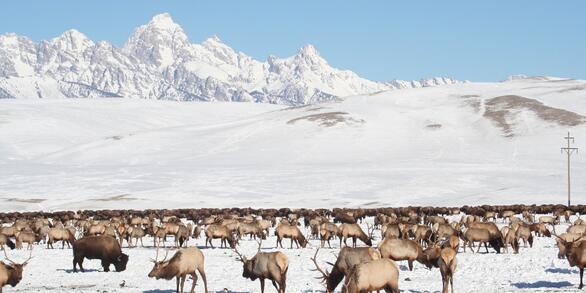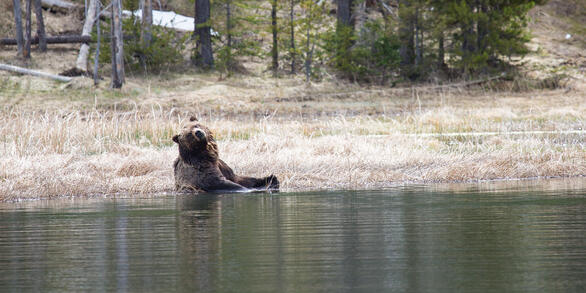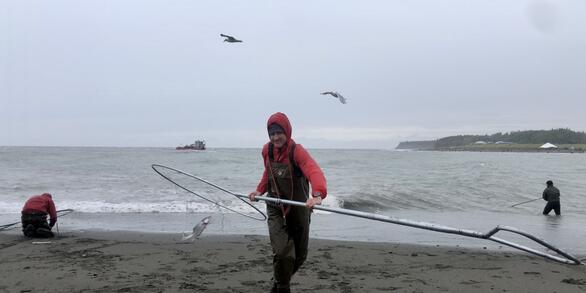Aaron J Enriquez, PhD
Aaron Enriquez is a Research Economist in the Social and Economic Analysis Branch at the USGS Fort Collins Science Center. Aaron specializes in environmental and natural resource economics, including nonmarket valuation and bioeconomic modeling. His main areas of research are the economics of wildlife and outdoor recreation.
Wildlife Economics

Wildlife economics can help us better understand, and sometimes even quantify, the various relationships between humans and wildlife species. Moreover, this research can help uncover key insights about socially optimal management of wildlife species, which is especially important in rapidly changing environments and conditions.
Research Highlight: How much is that grizzly in the window?

Wildlife viewing, pristine ecosystems, photogenic landscapes – how would you convey the economic value of the seemingly priceless resources that National Parks provide? While it can be difficult to put a value on nonmarket goods and services, in a new study, economists from the National Park Service and USGS developed an approach for doing just that with bears.
Aaron is particularly interested in research on the links between economic and ecological systems. He has worked on many environmental and natural resource applications, including quantifying the recreation value generated by National Park Service sites, determining people's willingness to pay to conserve wildlife in and around protected areas, estimating the economic benefits people obtain from wildlife viewing, and examining how people's risk perceptions influence their behaviors toward wildlife and pests.
Aaron's passion for environmental and natural resource research stems from an interdisciplinary background. He has received a B.S. in Biology, a B.S. in Economics, an M.S. in Economics, Environment and Natural Resources, and a Ph.D. in Economics. As a graduate student, Aaron studied human-grizzly bear interactions in the Greater Yellowstone Ecosystem. As a postdoc, he estimated the nonmarket value of Alaska salmon using fishing permit data.
Professional Experience
Research Economist, USGS Fort Collins Science Center (2023 - present)
Postdoctoral Fellow, Department of Economics, University of Alaska Anchorage (2021 - 2023)
Research Assistant, Social Science Program, National Park Service (2020 - 2021)
Research Assistant, Department of Economics, University of Wyoming (2015 - 2021)
Education and Certifications
Ph.D. in Economics, University of Wyoming (2021)
M.S. in Economics, Environment and Natural Resources, University of Wyoming (2017)
B.S. in Economics, University of Wyoming (2015)
B.S. in Biology, University of Wyoming (2015)
Science and Products
Economics of Outdoor Recreation
Wildlife Economics
Economic Impacts of Public Lands Management
Social and Economic Analysis (SEA) Branch
Environmental and Natural Resource Economics
Related News: How much is that grizzly in the window?
Related News: Wild about wildlife: leveraging park visitor support for conservation
Scoping decision-maker needs and science availability to support regional natural capital accounting in the U.S. Colorado River Basin Scoping decision-maker needs and science availability to support regional natural capital accounting in the U.S. Colorado River Basin
Tradeoffs and win-wins between large landscape conservation and wildlife viewing in protected areas Tradeoffs and win-wins between large landscape conservation and wildlife viewing in protected areas
Urban tick exposure on Staten Island is higher in pet owners Urban tick exposure on Staten Island is higher in pet owners
Simple stated preference questions can enhance transdisciplinary projects: Linking perceived risks with willingness to spray and pay Simple stated preference questions can enhance transdisciplinary projects: Linking perceived risks with willingness to spray and pay
Valuing wildlife sightings at the species-wide and individual animal levels: An approach and application to bear viewing in Yellowstone National Park Valuing wildlife sightings at the species-wide and individual animal levels: An approach and application to bear viewing in Yellowstone National Park
Non-USGS Publications**
**Disclaimer: The views expressed in Non-USGS publications are those of the author and do not represent the views of the USGS, Department of the Interior, or the U.S. Government.
Science and Products
Economics of Outdoor Recreation
Wildlife Economics
Economic Impacts of Public Lands Management
Social and Economic Analysis (SEA) Branch
Environmental and Natural Resource Economics
Related News: How much is that grizzly in the window?
Related News: Wild about wildlife: leveraging park visitor support for conservation
Scoping decision-maker needs and science availability to support regional natural capital accounting in the U.S. Colorado River Basin Scoping decision-maker needs and science availability to support regional natural capital accounting in the U.S. Colorado River Basin
Tradeoffs and win-wins between large landscape conservation and wildlife viewing in protected areas Tradeoffs and win-wins between large landscape conservation and wildlife viewing in protected areas
Urban tick exposure on Staten Island is higher in pet owners Urban tick exposure on Staten Island is higher in pet owners
Simple stated preference questions can enhance transdisciplinary projects: Linking perceived risks with willingness to spray and pay Simple stated preference questions can enhance transdisciplinary projects: Linking perceived risks with willingness to spray and pay
Valuing wildlife sightings at the species-wide and individual animal levels: An approach and application to bear viewing in Yellowstone National Park Valuing wildlife sightings at the species-wide and individual animal levels: An approach and application to bear viewing in Yellowstone National Park
Non-USGS Publications**
**Disclaimer: The views expressed in Non-USGS publications are those of the author and do not represent the views of the USGS, Department of the Interior, or the U.S. Government.







